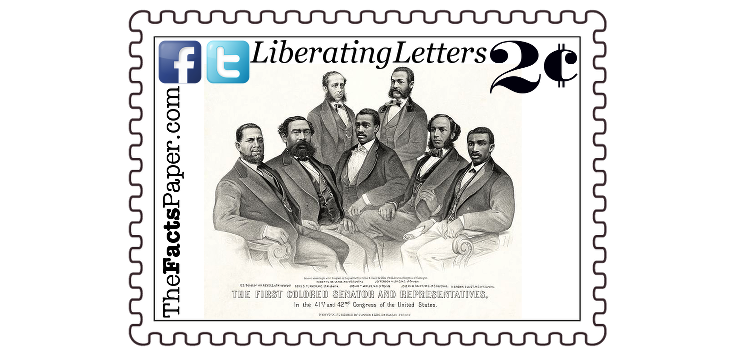February 3, 2016
Dear Liberty,
Monday kicked off the 2016 election cycle as citizens cast their votes in the Iowa Caucus. As a republic, founders gave the power of electing officials to the citizens instead of the ruling class based on nobility or a dictator brought forth by military conquest. Today every citizen 18 years and older has the right to participate in the democratic process of choosing our elected officials. But it wasn’t always that way.
Believing in limited federal government and strong state governments, the founders did not define the criteria for a voter. Instead, as emphasized in the 10th Amendment, they left those requirements to the individual states. Most states determined landowning males of any ethnicity were eligible to vote. New Jersey allowed women landowners to vote for a time and four states even permitted free slaves to cast ballots. By the Civil War, most white men, regardless of property ownership, had voting rights in all states.
The North’s victory in the war was only the beginning of the fight to give equal rights to not only Negros, but other minorities and women as well. Republicans overtook Congress and began working on “Reconstructing” the war-torn South. A series of laws and Amendments were proposed, ratified and adopted during the Reconstruction Era.
The 13th Amendment officially ended slavery in the United States of America. While the Emancipation Proclamation freed slaves in the Confederate states, this Amendment abolished slavery completely. (see How The South Was Won and Freedom Day)
Due to the Dred Scott decision in 1857, even though the slaves were free, they were not guaranteed citizenship. (see Dreadful Scott Decision) Chief Justice Roger B. Taney declared, “Dred Scott had no standing in the court system because blacks, regardless of whether they were free or slave, were not and could not be citizens.” (see Disunity of the Union) In addition, freedom abolished the 3/5ths Rule regarding Negros, even though they still lacked rights. This created a significant new problem. Republicans found themselves faced with the South having the ability to count Negros as a full person for congressional seats even though they had no right to vote for their representation. (see The New Trinity) The Supreme Court Dred Scott decision had to be corrected.
Republicans in Congress wanted to guarantee that Negros were not denied the right to vote as free Americans. Many states already had laws and regulations that hindered non-white voters, including poll taxes and religious and literacy tests. Southern states began passing even stricter laws after the war to prevent the newly freed slaves from exercising their fundamental right. Conveniently, white voters were grandfathered in and exempted from the new laws. Some states went as far as adopting new state constitutions to cement blockage of the black vote.
The Republican led Congress got to work and passed the Civil Rights Act of 1865, which was quickly vetoed by Democrat President Andrew Johnson. (see Views And Vetoes) Congress passed the bill a second time in 1866, which Johnson vetoed again. Collecting a two-thirds majority, Congress was able to override this veto, making the bill law. Republicans gave citizenship to the disenfranchised Negros, both slave and free, and defined the rights of American citizens. After passing the Civil Rights Act, many worried a law was not strong enough to ensure these rights could not be repealed or dismissed with newer laws.
This led to the 14th Amendment. It was constructed to constitutionally give citizenship to thousands of Negros, opening the doors for “equal protection of the laws” as well as all rights granted to citizens under the Constitution of the United States. It was adopted on July 9, 1868.
The Negros were now free and had citizenship, but that still did not grant them the automatic right to vote. Republicans tackled this on February 26, 1869, by proposing the 15th Amendment which simply stated no citizen shall be “denied or abridged by the United States or by any State on account of race, color, or previous condition of servitude” the right to vote.
After a difficult yearlong battle for ratification, the amendment reached its goal on February 3, 1870. As Southern states were readmitted into the Union, Negros continued to give control to Republicans in state and national elections. But it didn’t stop there. Once these Amendments were passed, doors opened for all men of color to not only have control over their own lives, they quickly began to enter the political arena themselves. Weeks after this last ratification, Republican Hiram Rhodes Revels from Natchez, Mississippi, was elected to the U.S. Senate, becoming the first Negro ever in the U.S. Congress. (see The Forgotten Senator) Twelve others soon became members of Congress during Reconstruction. (see From House Slave To House Of Representatives, The Forgotten Representative, and Riots And Rights) During this time over 600 blacks served in state legislatures with many others holding local offices.
AMERICA'S VOTING RECORD


Even though the new amendment gave the voting right to Negros, voter intimidation and violence suppressed the black vote for years. The Democrat organization of the Ku Klux Klan (KKK) effectively bullied Negros into either withholding their Republican vote or voting Democrat. (see Civil Rights...And Wrongs)
Once “race, color,” and “servitude” were fixed, Republican Senator Aaron A. Sargent decided to address gender. In 1878 he proposed an amendment for women’s suffrage. This fight took 41 years before it was won, becoming the 19th Amendment. (see The Right's Fight For Rights)
On Monday, the Republican caucus in Iowa voted for minorities as three of its top four primary picks. On the Democrat ticket, the winner was a woman. Many still see America as she was in the days of the Civil War but these results show just how great this country really is. It proves we are an accepting, diverse people who can unite on principles and values. The ones claiming racism seem to be the ones focusing on race, not ordinary Americans.
Liberty, voting is not only a right, it is a privilege. One that many across this world don’t have. It is your duty as a voter to be educated and informed on your electorate and to take serious the candidates asking for your vote. Many have fought both on and off the battlefield, and countless have died to give and preserve this right for you. It is up to you to honor that with careful consideration and prayerful examination.
That’s my 2 cents.
Love,
Mom


